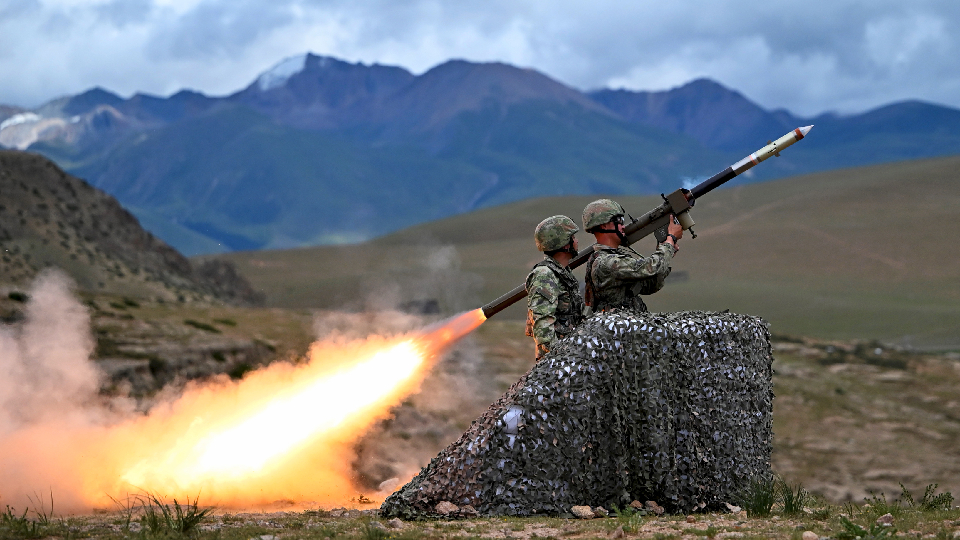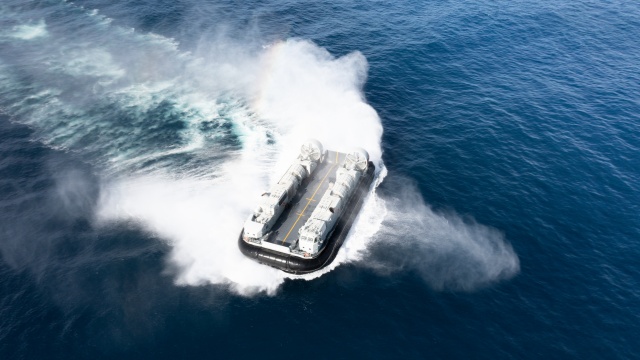Japanese Defense Minister Nobuo Kishi recently held talks with the visiting Indonesian Defense Minister Prabowo Subianto, during which he expressed grave concerns over China’s Coast Guard Law again, reported Kyodo News.
日本防卫大臣岸信夫日前与到访的印尼国防部长普拉博沃举行会谈。据共同社报道,二人会谈期间,岸信夫再次对中国的《海警法》表示严重关切。
Since the Chinese Coast Guard Law came into effect on February 1, the response from the US and Japan has been not only intense but also unusual. Japan has expressed its “grave concerns” over the law for nearly ten times on bilateral or multilateral occasions. But all the caw and clamor cannot hide the two countries’ real intention of deliberately misleading the public opinions and international community.
自中国《海警法》2月1日施行以来,日美的反应不仅强烈,而且显得很突兀。尤其是日本作为批评“急先锋”,利用双边或多边场合近十次表示对《海警法》“严重担忧”。但事实上,那是日美在故意混淆视听。
Washington and Tokyo’s criticisms of China’s Coast Guard Law focus on the unclear demarcation of sea areas within the jurisdiction, permission for the coast guard to use weapons and to take enforcement measures against foreign ships, and the “quasi-military nature” of the coast guard. But these criticisms are nothing but overreaction or even double standards both from the perspective of the international law, the similar laws in Japan and US, and the maritime enforcement practices.
日美对我《海警法》的批评主要包括管辖海域的范围模糊、允许海警使用武器、允许对外国船舶采取强制措施、海警的“准军队组织”属性等。但无论从国际法还是日美等国的同类法律及海上执法实践看,这些批评都属于反应过度,甚至搞双重标准。
The demarcation of mandated sea areas has nothing to do with the purpose of the Coast Guard Law. Similar laws in Japan and many other countries don’t define the specific law enforcement scopes either, and the coast guard laws of Vietnam and the Philippines only generalize the concept as mandated sea areas. The US Coast Guard’s scope of enforcement powers at sea is even more general, including the high seas or the sea areas and airspace above where the US has a jurisdiction according to its law. The Chinese Supreme People’s Court issued a piece of judicial interpretation in August 2016 which specified the scope of sea areas under Chinese jurisdiction, which the Japanese Ministry of Defense has recently mentioned on its official website, indicating it knows the actual situation very well.
规定“管辖海域”范围与《海警法》的立法宗旨无关,日本等多国的同类法律也未明确规定具体执法范围,越南、菲律宾的《海警法》只是用“管辖海域”加以概括。美国海岸警卫队的执法海域更为宽泛,按《海岸警卫队法》的规定包括“公海或美国有司法权的海域及其上空”。实际上,中国最高人民法院2016年8月曾出台司法解释,明确了管辖海域的范围。日本防卫省近日还在官方网站提及此事,说明日方对此心知肚明。
It is an international practice to use weapons during maritime law enforcement when deemed necessary. According to the Law Concerning the Execution of Duties of Police Officials, the Japan Coast Guard (JCG) can use arms like regular police officers. The Japanese Coast Guard Law revised in 2001 also stipulates that when a ship refuses to stop and accept inspection and tries to resist and escape, the Coast Guard officers shall exercise conditional use of weapons if they don’t think there are other means to stop the ship from continuing its operation.
在海上执法中必要时使用武器,是国际通行做法。日本海上保安厅除依据《警察官职务执行法》可以和普通警察同样使用武器外,2001年又修改《海上保安厅法》,规定当船舶拒绝停船检查命令并抵抗、欲逃跑时,海上保安厅官员如果认为没有其他手段阻止其前进,也可以有条件使用武器。
Some foreign media have intentionally misinterpreted or distorted China’s Coast Guard Law by claiming that it authorizes law enforcers to use weapons against foreign military ships and government ships without warning. Article 47 and Article 48 of the law prescribe the situations where arms can be used, such as illegal transport of weapons and ammunition, attacking law enforcement ships or craft, among others. Article 49 also provides that direct use of arms is limited to the situation when “there is no time for warning or warning may lead to more serious consequences”, which is reasonable from a practical point of view and consists with the Regulations on Use of Police Implements and Arms by the People’s Police.
至于有外国媒体渲染中国《海警法》授权不经警告就对外国军舰和政府船舶使用武器,更是曲解。该法第四十七条、第四十八条对可以使用武器的情形做了规定,如非法运载武器弹药、攻击执法船舶或航空器等。根据第四十九条规定,直接使用武器只限于“来不及警告或者警告后可能导致更为严重后果”时,从实践上说这是合理的,而且与《警察使用警械和武器条例》相一致。
Regarding enforcement measures, Article 30 of the United Nations Convention on the Law of the Sea states, “If any warship does not comply with the laws and regulations of the coastal State …the coastal State may require it to leave the territorial sea immediately.” Article 18 of Japan’s Coast Guard Law states, when the Coast Guard officers decide that crimes may be in progress on the sea, structures are being damaged, or there are other emergency states, they can order the ship to stop, change course, or sail to a designated location. The American Coast Guard Law simply authorizes armed law enforcement against any ship.
关于强制措施,《联合国海洋法公约》第三十条规定,沿海国可以要求不遵守本国法律和规章要求的外国军舰离开领海。日本《海上保安厅法》第十八条规定,当海上保安官认定海上犯罪可能正在进行、损坏建筑物等紧急事态时,可以命令船只停船、变更航线、驶向指定场所等。美国《海岸警卫队法》则规定,可以对“任何船舶”使用武力强制执法。
It is also a common international practice to incorporate maritime law enforcement into the military system and entrust it to carry out military missions in wartime. In countries like the UK, France, and Italy, it is the military that’s responsible for law enforcement on the sea. The US Coast Guard is called the fifth service after the army, navy, air force, and marine corps, which is usually under the lead of the Department of Homeland Security but operates as part of the navy in wartime, and its predecessor, the Revenue Cutter Service, participated in WWI and WWII directly. Although Japanese law stipulates that the Japan Coast Guard is part of the police force, it also allows the agency to be controlled by the defense minister during defensive and security operations based on the prime minister’s authorization.
海上执法力量被纳入军队编制,并在战时担负军事任务,在国际上也属常见。英国、法国、意大利等国本就由军队负责海上执法。美国海岸警卫队就是武装力量之一,被称为陆海空军、海军陆战队之后的“第五军种”,平时由国土安全部管理,战时作为海军的一部分行动,其前身“海上缉私队”曾直接参加一战、二战。日本虽在法律上明确海上保安厅属警察性质,但同时规定在防卫行动和安保行动时可根据首相授权由防卫相控制,只不过仍由海上保安厅长官具体指挥。
Besides, America and Japan’s maritime law enforcement practices have been widely questioned. In January 1990, the US Coast Guard shot at a Panamanian merchant ship leased by Cuba for one hour and 45 minutes in Mexico’s exclusive economic zone, on the grounds of possible drug dealing and refusal to accept America’s inspection. However, no drug was found onboard the ship when it entered the Mexican port for inspection. The shooting by US Coast Guard triggered a heated debate at the UN Security Council and was suspected of violating international law.
此外,美日海上执法实践存在的问题也广受质疑。1990年1月,美国海岸警卫队在墨西哥专属经济区以“可能贩毒及拒绝美国检查”为由,对古巴租用的巴拿马籍商船射击1小时45分钟,但在该船进入墨西哥港口接受检查后并未发现毒品。美国此举曾引发安理会激烈辩论,被质疑违反国际法。
Japan claims to “use weapons with caution and restraint”, and one of the necessary conditions set in its Coast Guard Law where weapons can be used against foreign ships is that the ship sails in Japanese territorial sea or inland waters beyond the innocent passage, except for military vessels and government ships for non-commercial purposes. However, the law enforcement practices of the Japan Coast Guard are also fraught with problems and doubts. On December 22, 2001, the agency caused a “suspicious ship” to sink with the use of arms in the Chinese exclusive economic zone, which caused the death of at least 15 crew members onboard. It was the gravest vicious event of the use of a weapon in the East China Sea for several decades and was extremely rare even in the global history of maritime law enforcement.
日本自称“使用武器谨慎、克制”,其《海上保安厅法》规定对外国船舶使用武器的必要条件之一是在日本领海或内水航行并不属无害通过,而且军舰和非商业目的的政府船舶除外。但海上保安厅的执法实践也存在众多问题和疑点,2001年12月22日在中国专属经济区使用武器造成一艘“可疑船舶”船沉人亡,就是其中一例。日本那次行动造成对方至少15名船员死亡,是几十年来在东海发生的最为严重的使用武器恶性事件,在世界海上执法实践中也极为罕见。
All these show that Washington and Tokyo’s bashing of China’s Coast Guard Law finds no basis in international law and contradicts their own laws and enforcement practices. They accuse the implementation of the Chinese law of aggravating tension in the East China Sea. Still, the fact is that since 2020, Japan, regardless of China’s warnings, has constantly indulged its right-wingers in operating in waters around China’s Diaoyu Dao on the pretext of fishing, which is the major cause of regional tension.
综合来看,日美对中国《海警法》的批评不仅缺乏国际法依据,并且与其自身法律、执法实践有矛盾的地方。日美指责中国《海警法》的实施会加剧东海局势紧张,但事实是2020年以来日方不顾中方警告,屡次放纵右翼分子以捕鱼为名前往中国钓鱼岛海域活动,成为局势紧张的重要根源。
(The authors, Hu Jiping and Xu Yongzhi, are respectively Vice President of China Institutes of Contemporary International Relations and an associate researcher at its Institute of Northeast Asian Studies.)
Editor's note: This article is originally published on huanqiu.com, and is translated from Chinese into English and edited by the China Military Online. The information, ideas or opinions appearing in this article do not necessarily reflect the views of eng.chinamil.com.cn.













